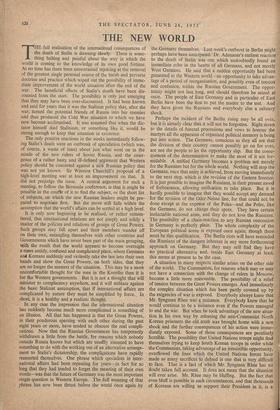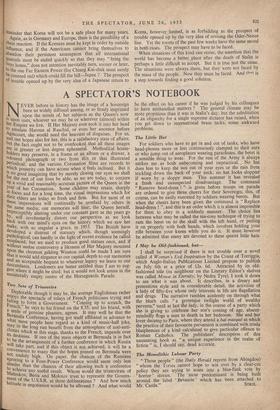THE NEW WORLD
THE full realisation of the international consequences of the death of Stalin is dawning slowly. There is some- thing halting and painful about the way in which the world is coming to the knowledge of its own good fortune. At no time has there been unrestrained rejoicing at the removal of the greatest single personal source of the harsh and perverse doctrine and practice which wiped out the possibility of imme- diate improvement of the world situation after the end of the war. The beneficial effects of Stalin's death have been dis- counted from the start. The possibility is only just emerging that they may have been over-discounted. It had been known and said for years that it was the Stalinist policy that, after the war, turned the potential friends of Russia into her enemies and thus produced the Cold War situation to which we have now become acclimatised. It was assumed that when the dic- tator himself died Stalinism, or something like it, would be strong enough to keep that situation in existence.
The only positive reactions in the weeks immediately follow- ing Stalin's death were an outbreak of speculation (which was, of course, a waste of time) about just what went on in the minds of the new rulers of Soviet Russia, and the emer- gence of a rather hasty and ill-defined argument that Western policy should be concerted against a new Russian policy that was not yet known. Sir Winston Churchill's proposal of a high-level meeting was at least an improvement on that. It did not prejudge the issue. A central argument for such a meeting, to follow the Bermuda conference, is that it might be possible in the course of it to find the subject, or the short list of subjects, on which the new Russian leaders might be pre- pared to negotiate first. But the move still falls within the assumption that the world's affairs can be settled at a high level.
It is only now beginning to be realised, or rather remem- bered, that international relations are not simply and solely a matter of the policies and relations of groups of Great Powers. Such groups may fall apart and their members wander off on their own, entangling themselves with other countries and Governments which have never been part of the main grouping, with the result that the world appears to become overnight a more untidy, confused and complicated place, where Germans and Koreans suddenly and violently take the law into their own hands and show the Great Powers, on both sides, that they are no longer the masters of the situation. This may be a more uncomfortable thought for the men in the Kremlin than it is for the Western governments. But it is not a thought that will minister to complacency anywhere, and it will militate against the basic Stalinist assumption, that if international affairs are complicated by nature they must be simplified by force. , In short, it is a healthy and a realistic thought.
In any case the impression that the international situation has suddenly become much more complicated is something of an illusion. All that has happened is that the Great Powers, in their ponderous sparring with each other during the past eight years or more, have tended to obscure the real compli- cations. Now that the Russian Government has temporarily withdrawn a little from the battle, for reasons which nobody outside Russia knows but which are usually assumed to have something to do with the working out of an alternative arrange- ment to Stalin's dictatorship, the complications have rapidly reasserted themselves. One phrase which specialists in inter- national affairs had been repeating for years—in fact for so long that they had tended to forget the meaning of their own words—was that the future of Germany was the most important single question in Western Europe. The full meaning of that phrase has now been thrust before the world once again by the Germans themselves. Last week's outburst in Berlin might perhaps have been anticipated. Dr. Adenauer's earliest reaction to the death of Stalin was one which undoubtedly found an immediate echo in the hearts of all Germans, and not merely West Germans. He said that a sudden opportunity had been presented to the Western world—an opportunity to take advan- tage of a period of reorganisation, and possibly even of tension and confusion, within the Russian Government. The oppor- tunity might not last long, and should therefore be seized at once. The people of East Germany and in particular of East Berlin have been the first to put the matter to the test. And they have given the Russians and everybody else a salutary shock.
Perhaps the incident of the Berlin rising may be all over, but it is already clear that it will not be forgotten. Right down to the details of funeral processions and vows to honour the martyrs all the apparatus of organised political memory is being put into action. The Germans, conscious as they all are that the division of their country cannot possibly go on for ever, are not the people to let the opportunity slip. But the conse- quences of the determination to make the most of it are for- midable. A unified Germany becomes a problem not merely for the Russians but for the whole world. Nothing will stop the Germans, once that unity is achieved, from moving immediately to the next step, which is the revision of the Eastern frontier. It is just possible to imagine the Russians, in their present mood of forbearance, allowing unification to take place. But it is hardly possible to imagine that they would accept any demand for the revision of the Oder-Neisse line, for that could not be done except at the expense of the Poles—and the Poles, like the Germans, do not change their spots. They have certain ineluctable national aims, and they do not love the Russians. The possibility of a chain-reaction to any Russian concession in Germany is perfectly plain. The whole complexity of the European political scene is exposed once again; though there must be this qualification. The Berlin riots will have reminded the Russians of the dangers inherent in any more forthcoming approach on Germany. But they may still find they have no practical alternative and, inside East Germany at least, this seems at present to be the case.
A situation in many respects similar arises on the other side of the world. The Communists, for reasons which may or may not have a connection with the change of rulers. in Moscow, become a little more reasonable. The possibility of a relief of tension between the Great Powers emerges. And immediately the complex situation which has been partly covered up by the exigencies of war is exposed. Everybody always knew that Mr. Syngman Rhee was a nuisance. Everybody knew that he would continue to be a nuisance even if the Powers managed to end the war. But when he took advantage of the new situa- tion in his own way by releasing the anti-Communist North Korean prisoners the old truth was brought home with a new shock and the further consequences of his action were imme- diately exposed. Some of those consequences are peculiarly horrible. The possibility that United Nations troops might find themselves trying to keep South Korean troops in order while the Communists, taking advantage of an irresistible opportunity, overflowed the lines which the United Nations forces have made so many sacrifices to defend is one that is very difficult to face. That is a fact of which Mr. Syngman Rhee has no doubt taken full account. It does not mean that the situation will ever arise. Mr. Rhee may be bluffing. But the fact that even bluff is possible in such circumstances, and that thousands of Koreans are willing to support their President in it, is a reminder that Korea will not be a safe place for many years.
Again, as in Germany and Europe, there is the possibility of a chain reaction. If the Koreans must be kept in order by outside Influence, and if the Americans cannot bring themselves to abandon their persistent assumption that all international quarrels must be ended quickly so that they may " bring the boYs home," does not attention inevitably turn, sooner or later, to the one Far Eastern Power (for Chiang Kai-shek must surely he counted out) which could fill the bill—Japan ? The prospect of trouble opened up by the very idea of a Japanese return to Korea, however limited, is as forbidding as the prospect of trouble opened up by the very idea of revising the Oder-Neisse line. Yet the events of the past few weeks have the same moral in both cases. The prospect may have to be faced. When situations of this kind can occur, the assertion that the world has become a better place after the death- of Stalin is perhaps a little difficult to accept. But it is true just the same. The situations were always there, but they were not faced by the mass of the people. Now they must be faced. And th.t. is a step towards finding a good solution.



































 Previous page
Previous page